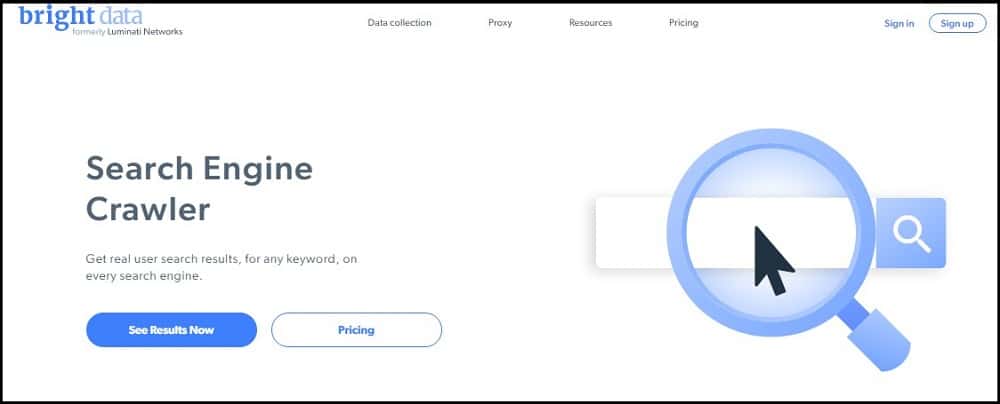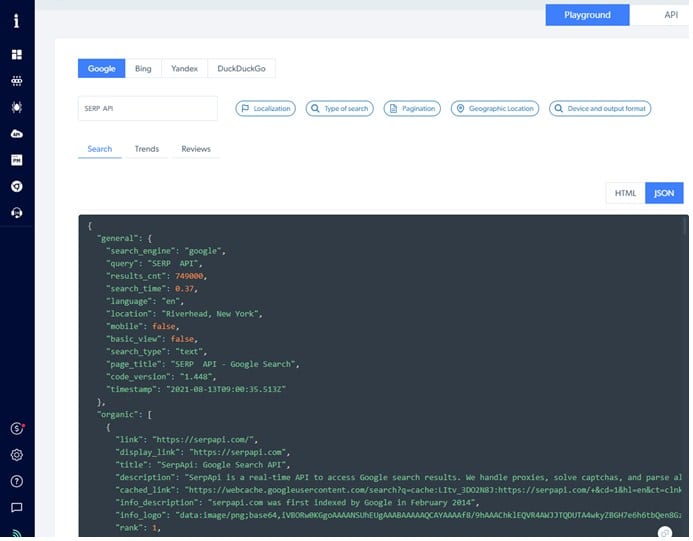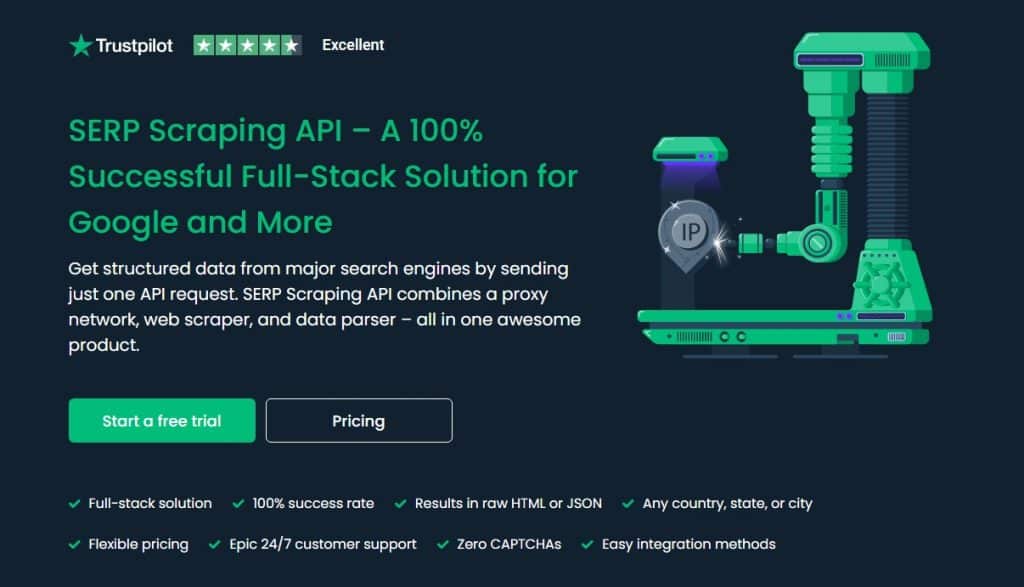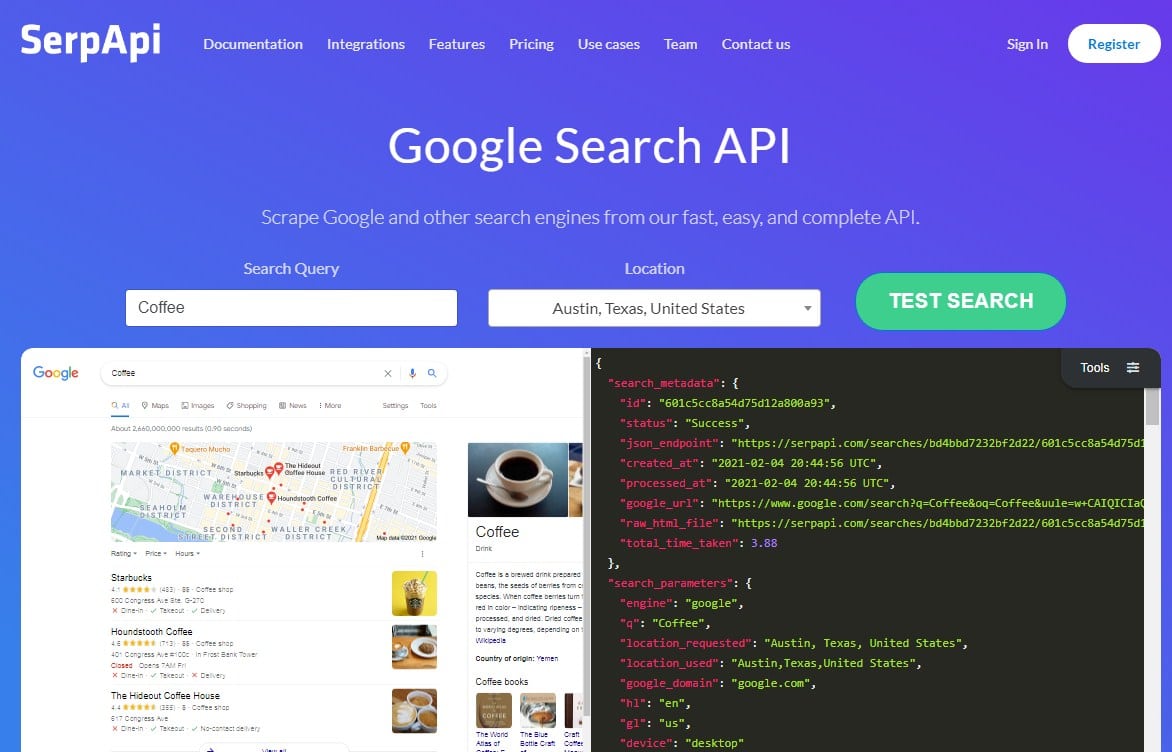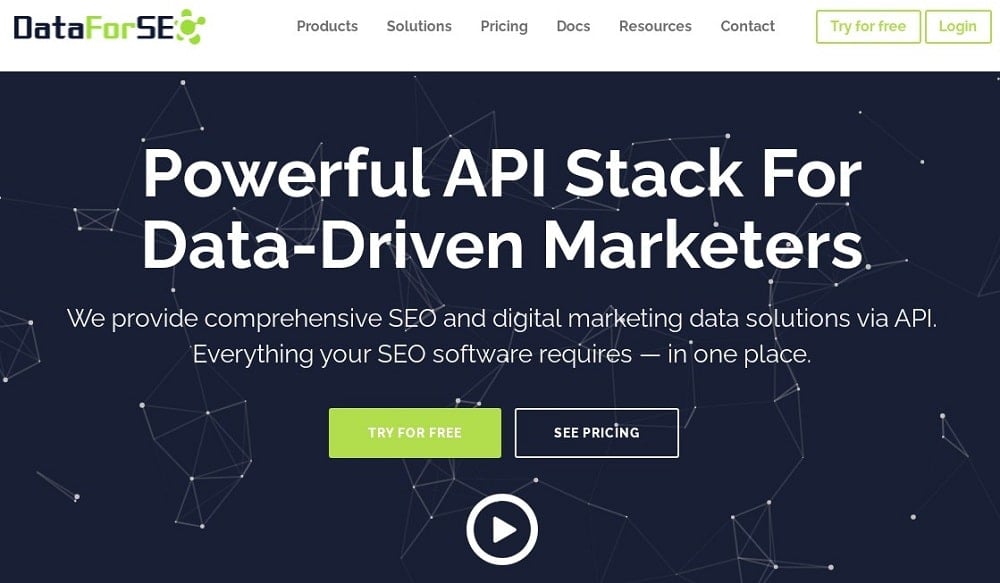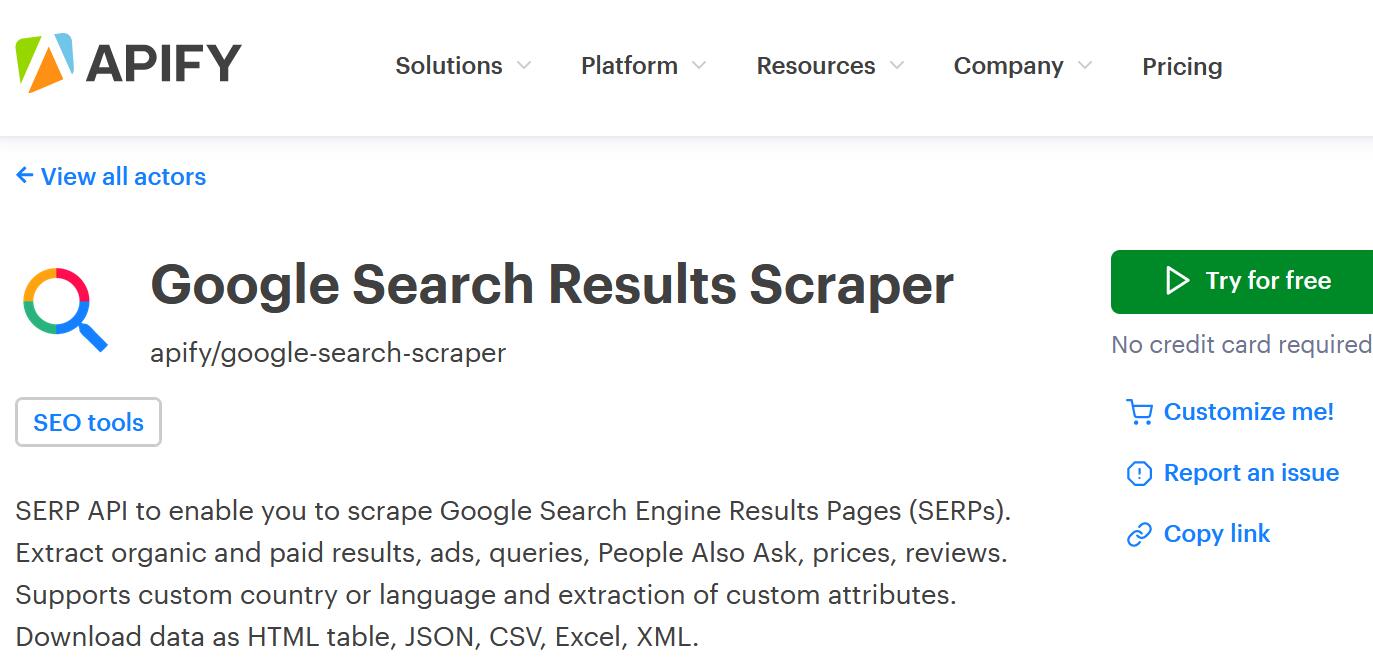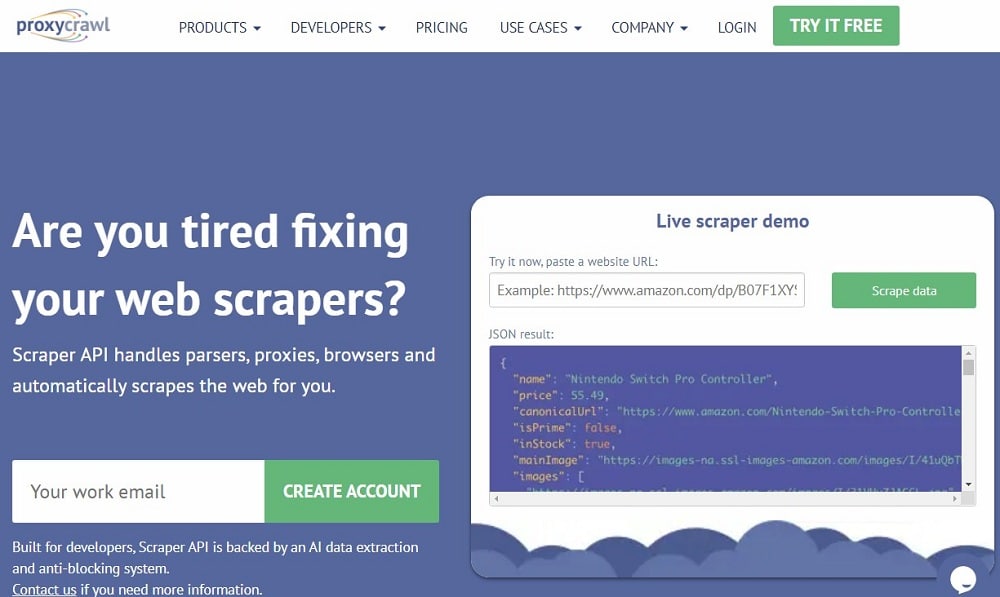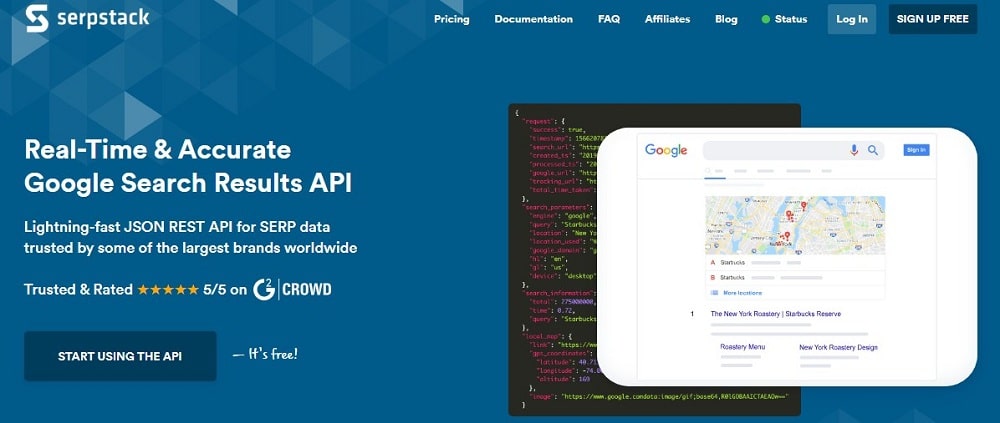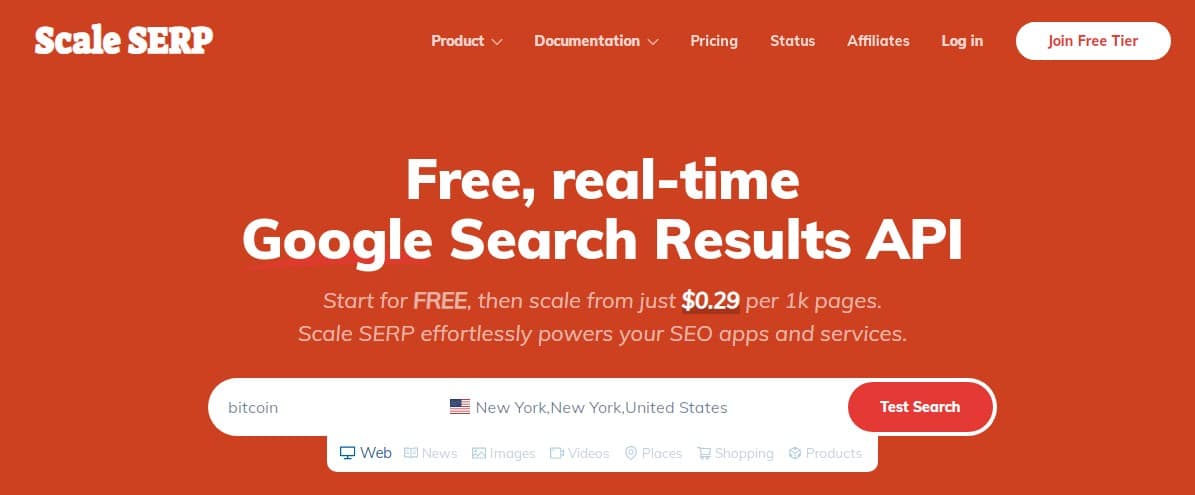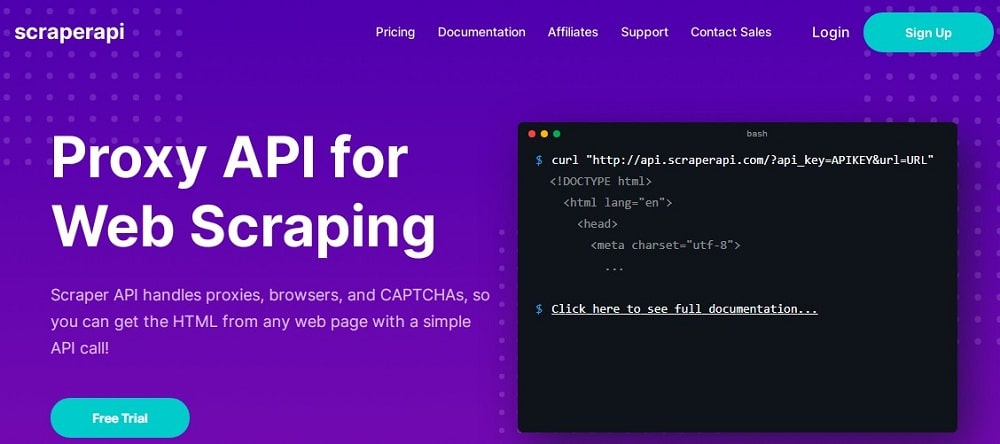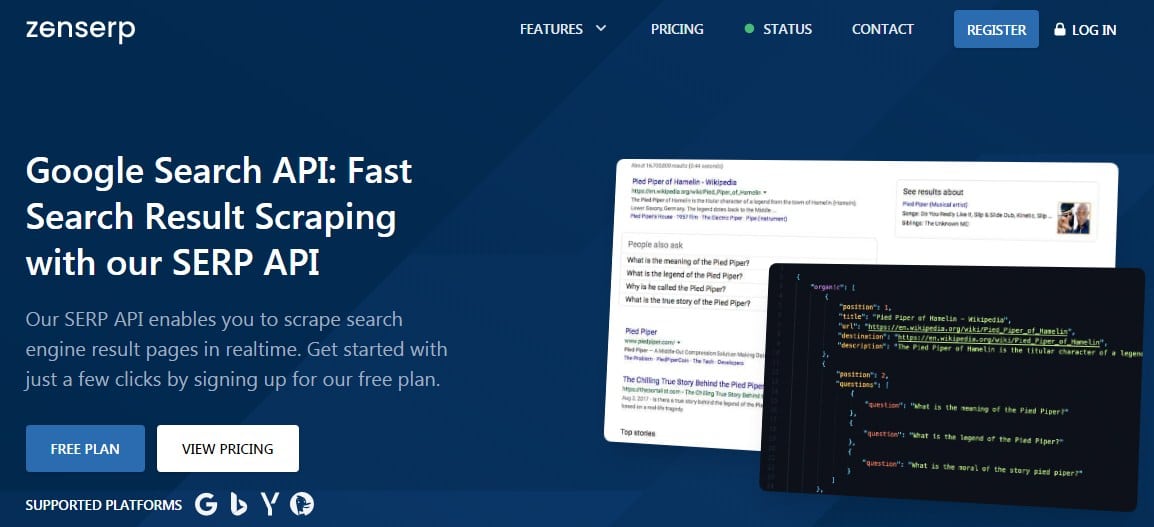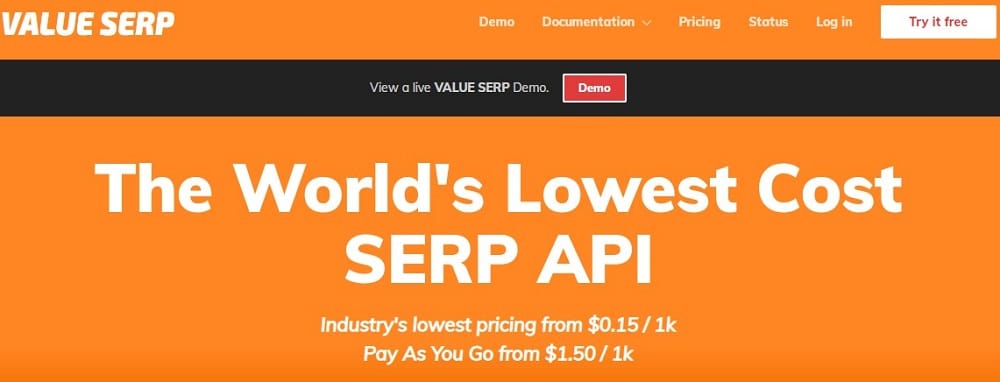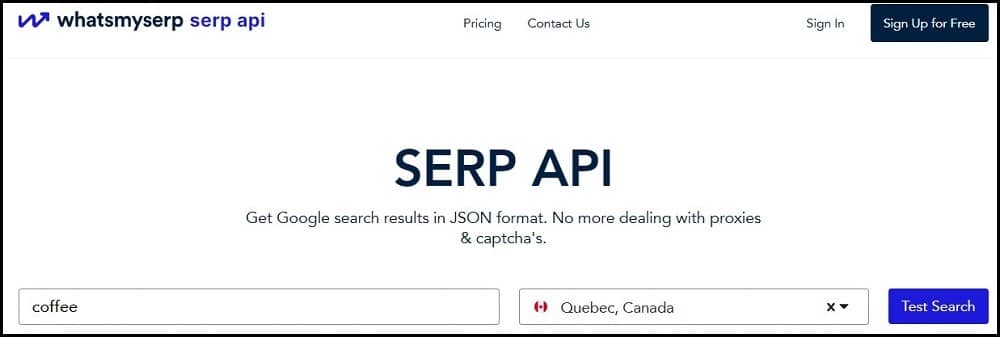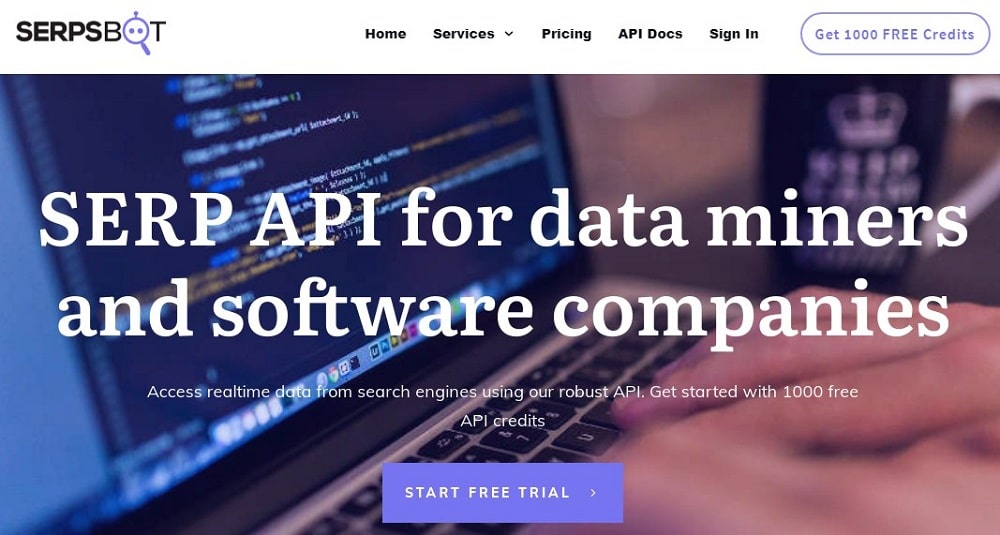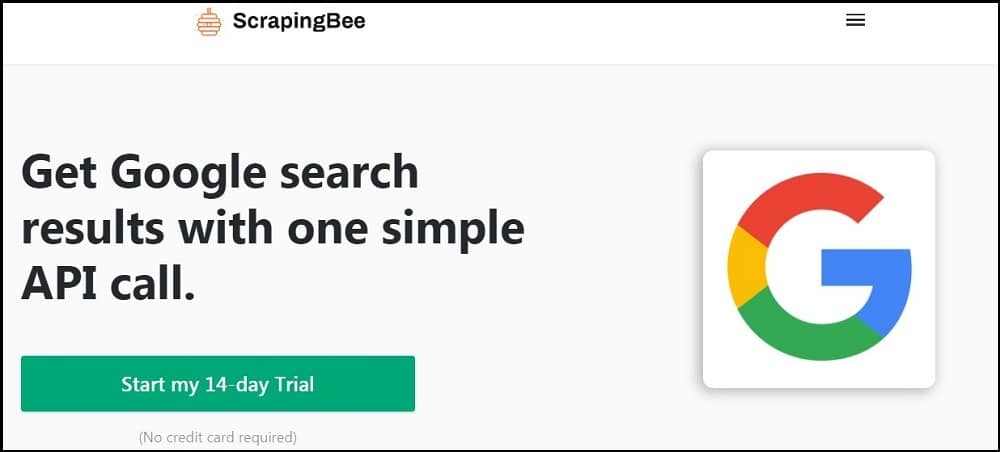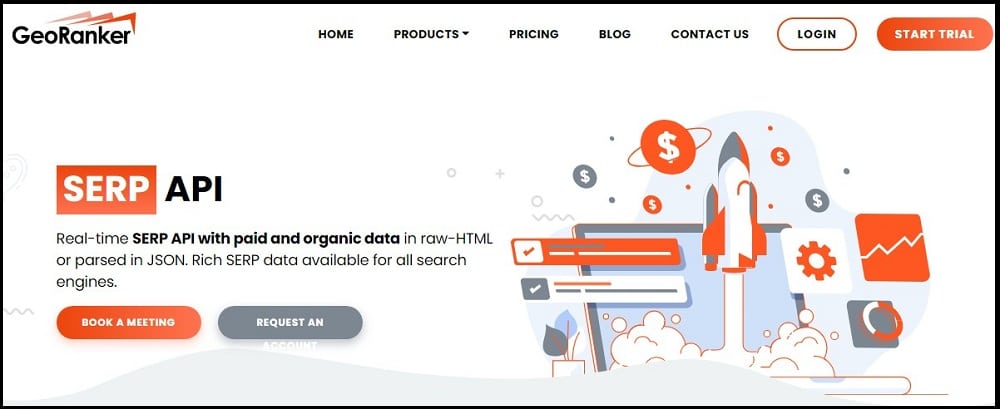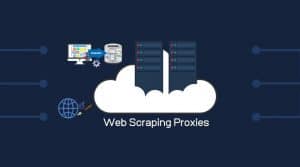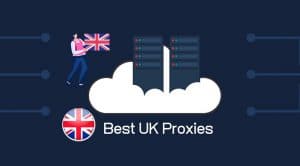This page will provide you recommendations on the best SERP API you can use to access real-time results and data on SERPs of popular search engines to improve your SEO.
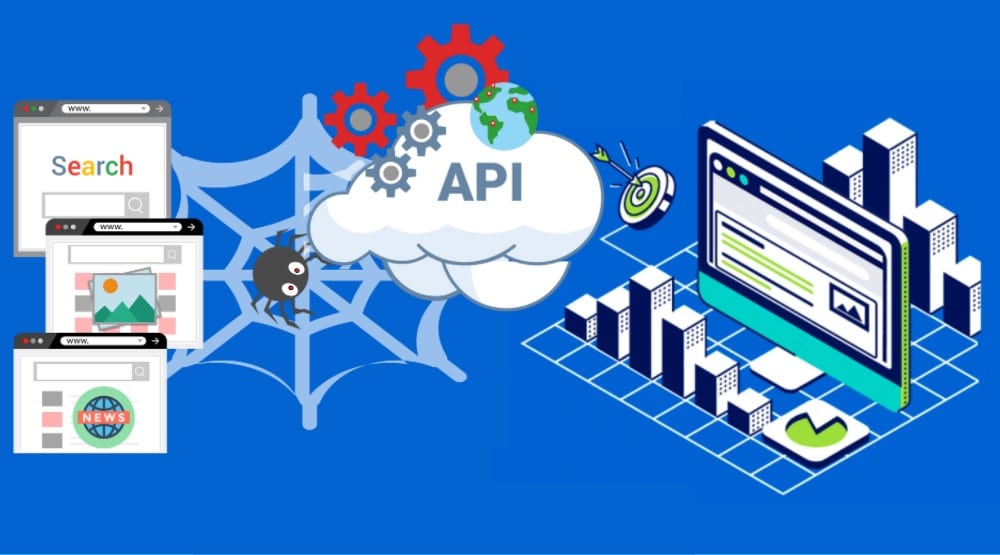
Overview of SERP APIs
- Bright Data: $500 for 200K searches – <all search engines supported> – depend on requests – No client library
- Smartproxy SERP API: $500 for 250K searches – <Full-stack solution> – customer support – No client library
- SerpApi: $3K for 1K searches – <10 search engines supported> – $1 free credit – client libraries provided
- DataForSEO: $50 for 50K searches – <5 search engines supported> – 100 searches free – client libraries provided
- Apify Google Scraper: Free, but you need proxies – <Google only> – Free to use – Node.js library only
- Proxycrawl Google Scraper: $29 for 50K searches – <Google only> – Free trial available – No client library
- Serpstack: $29 for 5K searches – <Google only> – 100 searches free – No client library
- Scale SERP: $0.29 for 1K searches – <Google only> – 125 searches free – client libraries provided
- ScraperAPI: $29 for 250K requests – <all SERPs> – 5K API calls free
- Zenserp: $29 for 5K searches – <Google and YouTube> – 50 searches free – client libraries provided
- Value SERP: $1.5 for 1K searches – <Google only> – 100 searches free – No client library
- Whatsmyserp: $45 for 5K searches – <Google only> – 100 searches free – No client library
- SERPMaster: $20 for 5K searches – <Google only> – 250 searches free – No client library
- SerpsBOT: $1 for 1K searches – <4 search engines supported> – 1000 free credits – No library supported
- ScrapingBee: $29 for 4K searches – <Google only> – 40 free searches – client libraries provided
- GeoRanker: $300 for 300K searches – <10 search engines supported> – 7 days (payment method required) – No client library
Search Engine Result Pages (SERPs) appeals to both online users and marketers but in two different ways. Online users discover pages and products from the SERPs while marketers use SERP to gather data in other to improve their content to have the chance of ranking higher or discover what search engine users are looking for in other to create content or product for them. This article has been written for Internet marketers that have interest in collecting keyword, ranking, and other types of available data from result pages of search engines.
We would be recommending some of the best SERP APIs in the market that you can use to scrape data from result pages of major search engines such as Google, Bing, Amazon, and other search engines. Without using this, you will have to do some heavy lifting, and in most cases, except you are experienced, you will not succeed as you will be blocked and barred from using accessing the website you are trying to collect SERPs data from.
What is a SERP API?

SERP API is an API designed to extract data from result pages of search engines such as Google Search. At its most basic level, a SERP API is nothing more than a regular web scraper. It sends requests to search engines using your provided query, gets the whole page as a response, and parses out the required content. However, while this model is simple and easy to grasp, it does not provide an overall understanding of what SERP APIs do.
They are much more advanced than this simple model and incorporate advanced features such as an anti-bot bypassing system, proxy support, and JavaScript rendering, among others. With a good SERP API, your focus would be on other aspects of SEO and not on data extraction from SERPs.
Why Scrape SERP Data?
Search engines, whether they like it or not, would remain some of the most popular targets for web scraping, especially for SEO purposes. This is because their result pages, otherwise known as SERPs content a huge amount of data that is of interest to Search Engine Optimizers. Some of these are described briefly below.
-
Keyword Data

Take, for instance, if you search for a keyword on Google, the search result will contain suggestions for further search. There’s a section for “people also ask”, “people also search,” and “Rich Snippets“, which contains keywords you can use to write better SEO optimized content that does not only appeal to Google but also appeals to your readers. Aside from these, there are numerous other keyword data on Google Search and other search engines that are of interest to SEO.
-
Ranking Data

One of the focal points of SEO is ranking, and Internet marketers want to know at every point in time how their pages and that of their competitors rank for keywords of interest.
This gives them an idea if they are winning the SEO game or they are losing. Rank data is very important even to competitor search engines. There’s was a rumor in the past about Bing scraping Google ranking data for some specific keywords to fine-tune its own ranking for those keywords.
-
Other Types of Data

Aside from keyword-based and ranking data, there are other types of data on result pages, depending on the search engine. Take, for instance, on Google; there’s the local result for places, a section for Google Ads, and even maps.
E-commerce search engines might have a special section for featured ads. The search engine you are looking at would determine other data types of interest to you.
Top 15 SERP APIs to Scrape Real-Time Search Engine Result Pages
There are many SERP APIs in the market that you can use to scrape data from SERPs of different websites. We would be discussing some of the tops ones, and you will learn about the capabilities of each of them below.
Bright Data Search Engine Crawler
- Site Support: All popular search engines supported
- Language Client Libraries: None – web-based only
- Pricing: Starts from $500 for 200K requests monthly
- Free/Trial Plan: Free trial available
Bright Data was originally known to be a proxy provider, but it has grown to not only be a market leader in that but has also rebranded itself into a data collection service with Search Engine Crawler as one of its products. With their Search Engine Crawler, you can get real search results for any keyword for any location with just an API request.
This service has support for all popular search engines and can be regarded as one of the fastest in the market. It is highly customizable, making it possible to tailor it according to your specific need. However, just like most Bright Data products, their Search Engine Crawler tool can be said to be expensive.
Smartproxy SERP API
- Site Support: All popular search engines supported
- Language Client Libraries: None – web-based only
- Pricing: Starts from $50 for 13K requests monthly
- Free/Trial Plan: 3-day Free Trial (3K requests)
Smartproxy is known for its reliable residential proxy network. The service uses this reliable network to power its SERP API, which you can use to collect keyword and ranking-based data from search engines. The Smartproxy SERP API is particularly suited for scraping Google SERPs, and it is arguably one of the best so far.
However, it equally does better at scraping other search engines. You can extract organic as well as paid listing data from the SERPs and collect and extract keywords in the People Also Ask section and the other sections important to SEOs. The data collected are real-time data with up-to-date information.
With this, you can collect localized SERP data from any region of the world since Smartproxy supports about 195 countries and regions around the world. It helps you avoid blocks, deal with Captchas, and handle headless browsers. Pricing starts from $50, and that gives you the ability to send 13K requests.
SerpApi
- Site Support: Google, Bing, Yandex, DuckDuckGo, YouTube, and 5 others supported
- Language Client Libraries: Python, Java, C#, Ruby, and 4 others
- Pricing: Starts from $50 for 5K searches monthly
- Free/Trial Plan: 100 searches monthly
SerpApi is arguably one of the best real-time SERP APIs and an example of what a good SERP API should look like. This service makes the scraping of Google, Bing, Baidu, Yandex, DuckDuckGo, YouTube, Yahoo, and eBay, among others, easy by just sending a regular API request, and you will get a JSON response structured in a data structure that’s logical and easy to understand.
Aside from their restful API service, they have got libraries for popular programming languages, including Go, Python, Java, Ruby, PHP, Node.js, and even Google Sheets. It has support for geo-targeting, bypassing blocks, and even dealing with Captchas. SerpApi pricing model is based on the number of searches, and you only get to pay for successful requests.

DataForSEO
- Site Support: Google, Bing, Yandex, Yahoo, Baidu
- Language Client Libraries: Python, PHP, and C#
- Pricing: Starts from $50 for 16.666K searches monthly
- Free/Trial Plan: 100 searches monthly
DataForSEO prides itself on being a powerful API stack for data-driven marketers. It provides API solutions to Internet marketers in other to ease the extraction of data. Among the APIs provided is the SERP API, which has been designed to provide SEOs with structured SERP data with just an API request.
However, if you want, you can use their client libraries for popular programming languages. This service supports a good number of search engines, including Google, Yahoo, Bing, Yandex, and Baidu. One thing you will come to like about DataForSEO is its pricing system which is pay-as-you-go, and your balance has no expiry date as most other services do.
Apify Google Search Result Scraper
- Site Support: Google only
- Language Client Libraries: Node.js only
- Pricing: Free, but you will need to setup proxies
- Free/Trial Plan: Free
This SERP API is one of the best SERP API in the market. Unlike the above,which have support for a good number of search engines, the Apify Google Search Result Scraper has been designed only for scraping Google’s search results.
With this tool, you can extract both organic and paid results, as well as other details available in Google SERPs as JSON, HTML, CSV, XML, or even excel files. One thing you need to know is that this has been developed for the Apify platform, and as such, you will need the Apify module, which is for the Node.JS platform. This tool is free, but you will need to add proxies yourself.
Proxycrawl Google Scraper
- Site Support: Google only
- Language Client Libraries: None – web-based only.
- Pricing: Starts from $29 for 50K credits monthly
- Free/Trial Plan: available
Proxycrawl offers a Google search API that you can use in place of the official Google API because of the limitation of the official API. This SERP API, just like the one provided by Apify, is meant for scraping only Google Search.
Interestingly, it does that perfectly as you can use it to scrape Google content worldwide using a simple cURL request. There is a vast amount of publicly available data on Google, and this tool will help you get your hands on it without you thinking of blocks and Captchas. In terms of pricing, this service can be said to be affordable as you can get started with $29.
Related,
- Google Map Scraper 101: How To Scrape Data From Google Maps
- Google Real-time Search results Scraper 101: How to Scrape Google SERPs
Serpstack
- Site Support: Google only
- Language Client Libraries: None – web-based only
- Pricing: Starts from $29 for 5K searches monthly
- Free/Trial Plan: 100 searches monthly
The Serpstack is another SERP API that you can use for scraping result pages of Google Search – both web and images. This tool is quite scalable and ensures that your requests go through and return responses quickly.
It is also highly customizable and gives you the option of sending queries based on your location, language, and device. Serpstack does not require you to download any software to use as it is available as a JSON REST API. Interestingly, it offers users 100 free searches monthly. However, if you want more, you will need to pay for it, and the pricing starts at $29 for 5K searches.
Scale SERP
- Site Support: Google only
- Language Client Libraries: None – web-based only
- Pricing: Starts from $4 for 250 searches monthly
- Free/Trial Plan: 125 searches monthly
The Scale SERP tool is also a Google Search-only tool. However, one thing you will come to like about it is its low-cost nature, as you can get started for free to get 125 search results monthly.
However, if you want to scale up, then the price per 1K searches is $0.29, which you will agree with me that is affordable. Scale SERP integrates well with Node.js, Python, and PHP. You can also access it via HTTP and Curl requests. This SERP API tool is robust and offers excellent performance, capable of running over 15K requests in parallel. It is customizable, easy to use, and reliable.

ScraperAPI
- Site Support: all SERPs
- Language Client Libraries: None – web-based only
- Pricing: Starts from $29 for 250KAPI calls.
- Free/Trial Plan: 5K requests for 7 days
The ScraperAPI is one of the best proxy APIs for scraping SERP. Unlike the others, it does not feature a parsing tool that would ease your tasks. However, when it comes to downloading all of the content on SERPs for you to scrape, it is unmatched.
It has over 40 million IP addresses in its pool and has support for about 4O locations from which you can collect local SERP data for. ScraperAPI will help you handle proxies, headless browsers, and even Captchas – so you do not have to. The pricing is one of the cheapest amounts for the premium providers and it offers you about a 5K free trial as a new user valid for 7 days.
Zenserp
- Site Support: Google search engines and YouTube
- Language Client Libraries: None – web-based only
- Pricing: Starts from $29 for 5K searches monthly
- Free/Trial Plan: 50 searches for new users
Another versatile SERP API that you can use to scrape data from multiple Google search engines. Zenserp currently has support for Google search, trends, shopping, and even YouTube search. Aside from the fact that it supports many Google platforms, this service has support for popular programming languages including Python, Ruby, JS, C#, and Java.
It is highly scalable and customizable, making it possible for you to have localized and personalized results. In terms of pricing, Zenserp can be said to be affordable. It offers only 50 searches as a free trial for new users. Zenserp can be used to scrape all data, including maps, videos, knowledge graphs, paid results, and much more.
Value SERP
- Site Support: Google
- Language Client libraries: None
- Pricing: Starts from $1.5 for 1000 searches
- Free Trial: 100 searches
For every service, there’s one provider that offers its service at an affordable price range. For the SERP API category, the Value SERP service is that service. From its name, you can tell that it has its eyes on pricing. If you go for their pay-as-you-go plan, then the price per 1K searches is $1.5, which is quite affordable.
However, the unbeatable deals are in their monthly plan that could bring down the price of 1K searches to as low as $0.15 depending on the package you subscribe to. Value SERP only has support for Google Search, and it works just like a typical HTTP API. It has some resemblance with SerpWow, but SerpWow seems to be a more advanced and feature-packed service than it is.
Whatsmyserp
- Site Support: Google
- Language Client Libraries: None
- Pricing: Starts from $45 for 5,000 searches
- Free Trial: 100 searches
The Whatsmyserp service is a specialized SERP scraper developed for extracting ranking and tracking the Google SERP for noticeable changes. This service also offers a custom SERP API that you can use to extract the content of a search query in JSON format. All you need to do is send a query with the keyword and geo-location you want the SERP for, and your result will be delivered in no time.
The Whatsmyserp SERP API is fast, stable, and reliable for all kinds of SEO enthusiasts and experts. One thing you will come to like about this tool is that it offers easy-to-understand documentation for those that would want to integrate their API into their custom code in Python, Ruby, Java, Go, PHP, and Node.js.
SERPMaster
- Site Support: Google
- Language Client Libraries: None
- Pricing: Starts from $20 for 5000 searches
- Free Trial: 250 searches

One this you will like about this tool is that it is advanced, allow you to extract all types of data on Google Search, including featured snippets, Knowledge panel, Twitter Feeds, top stories, paid ads, product listing, and carousel. There’s also the option of choosing browser and device type. You can integrate it into your custom code and get search results in real-time. Pricing is affordable and cheap.
SerpsBOT
- Site Support: Google, Bing, Yandex, and DuckDuckGo
- Language Client Libraries: None
- Pricing: Starts from $1 for 1000 searches
- Free Trial: 1000 free API credits
The SerpsBOT SERP API has support for Google, Bing, Yandex, and DuckDuckGo. With SerpsBOT, you can reliably get real-time search data in a timely manner. This is not a basic tool as you can use it to extract all content on the SERPs, including knowledge graphs, featured snippets, and people also ask. It has support for both JSON and HTML. Just like the other tools above, SerpsBOT offers a free trial, so new customers can try out the service and see whether they meet their requirements before making a monetary commitment. Pricing can be said to be affordable, and the model is pay-as-you-go.
ScrapingBee
- Site Support: Google
- Language Client Libraries: Python, Node.js, PHP, Go, Ruby, and Java
- Pricing: Starts from $29 for 4000 searches
- Free Trial: 40 searches (14 days)
ScrapingBee is popular among web scrapers for offering them the ability to scrape content from the Internet without thinking about proxies, blocks, headless browsers, and even Captchas. Aside from its general scraping API, it has a Google API that you can use to extract the content on result pages of Google by just sending an API request.
Content available for extraction includes organic results, ads, local results, related queries, and questions. For new users, you can utilize the 1000 free search API credit to test out the service. This will give you 40 searches. ScrapingBee is one of the best tools available to web scrapers.
GeoRanker
- Site Support: Google, Bing, Yandex, and 7 others
- Language Client Libraries: None
- Pricing: Starts from $300 for 300K searches
- Free Trial: 7 days but with conditions
The GeoRanker tool has been designed for SEOs, and it has a set of tools developed for web scraping and data mining. One of the tools relevant to use in this article is the GeoRanker SERP API which has been developed to help SEOs and data miners extract the content of SERPs of different search engines. The supported search engines for GeoRanker include Google, Bing, Yandex, YouTube, Amazon, Naver, and a few others. With the GeoRanker SERP API, you can scrape organic and paid results, answer box, local pack, featured snippets, and top stories, among others.
They have support for both instant and delay results, and you can get results for any location or device. The major downside of GeoRanker is that its minimum monetary commitment would be considered expensive by many small SEOs as you require $300 minimum to get started – this will give you 300K requests.
FAQs About SERP API
-
How Do SERP APIs Work?
At their most basic level, SERP APIs are web scrapers that send search requests to search engines, retrieve the content, and parse all of the important data. They are able to do this by internally using proxies, headless browsers, and Captcha solvers since search engines do not like being scraped.
However, unlike regular scrapers, these ones are on the cloud, not on your computer, and are accessed using HTTP requests. You use parameters appended to the URL to give it specific commands such as the geo-location, number of searches, and the type of device.
-
Is the Use of SERP API Illegal?
As stated earlier, SERP APIs are web scrapers. In the past, the act of web scraping is seen as a grey area, with some saying it is legal while others think otherwise.
However, the lawsuit against HiQ Labs by LinkedIn in a US court has seen HiQ Labs victorious as the court sees the act of HiQ Labs scraping LinkedIn as legal since the data is publicly available and not hidden behind a password or paywall. Since SERPs are publicly available, then scraping them is legal.
-
Should You Use a SERP API or Develop a SERP scraper Yourself?
This will be a question of whether you want to reinvent the wheel or not – and if you have the technical skills required. Scraping search engines is difficult because they do more than just tracking and blocking your IP address.
They utilize other anti-scraping techniques that inexperienced scrapers cannot bypass. If you have what it takes, why not? But then you shouldn’t be doing that because you don’t want to spend because you will have to invest in proxies and a Captcha solver. The code will also need maintenance as the layout of your target changes.
- SEO Proxies to Master Google – Scraping Search Engines without Block and Captchas!
- Proxies for Preventing Bans and Captchas When Scraping Google
- The Best Google Proxies for SERP data &# Never Get Google Blocked
Conclusion
Scraping of search engines for SEO purposes has come to stay regardless of what search engines think or say. However, it can become less attractive and more difficult for inexperienced scrapers as search engines are becoming effective with their smart anti-scraping systems.
However, with the help of SERP APIs, we do not have to worry about keeping updated with changes as these APIs will do that and always furnish us with the SERP data we need for our SEO work.


